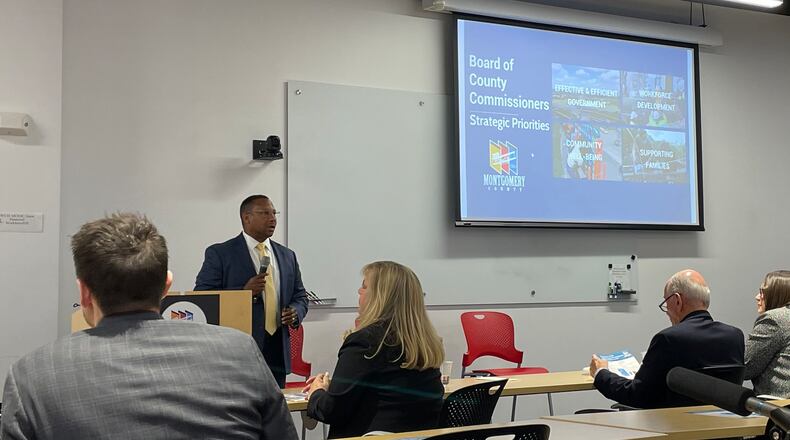“As we look at the state budget bill, we wanted to talk about how we can be a better partner,” Montgomery County administrator Michael Colbert told legislators and other community leaders who gathered at the Westown Employment Opportunity Center to discuss the county’s strategic priorities.
Montgomery County Commission said it will need funding for behavioral health care in jail, workforce programming, food accessibility, placement options in children’s services and more.
Mirroring the nation, Montgomery County has seen increased costs for placement service through children’s services. Colbert said service workers receive “more and more kids and more and more calls” every day.
“All of you have probably seen the challenges we’ve had at Children Services,” he said. “Post-COVID children have been disconnected from school. We have children with anger issues. You got kids that have family trauma at home.”
Colbert also warned of the lasting impact the COVID-19 pandemic will have on food insecurity. The emergency allotment of money through the Supplemental Nutrition and Assistance Program (SNAP) brought on by the pandemic ended earlier this year, and Colbert said the county is bracing itself for the rollback.
“These people will be impacted at a time when groceries have never been higher,” he said.
Nearly 80,000 people use SNAP benefits in Montgomery County, and nearly 180,000 people are on Medicaid, Colbert said.
Colbert asked lawmakers to increase support to the region’s food banks and other food-access nonprofits.
Another priority the county commission identified for funding needs is workforce development, including increasing funding for youth development and workplace flexibility, including childcare for Montgomery County’s workers.
Colbert said the county wants to build upon programming to help teenagers find employment and keep it.
Other priorities include funding to the Healthy Beginnings Home project – which held provide housing intervention to pregnant people at high risk of infant mortality – and the Ohio’s Housing Trust Fund, which supports local homelessness and housing services.
Montgomery County leaders also voiced opposition to H.B. 1, which would eliminate income tax rates that apply to non-business income and instead levy a flat tax rate of $360.69 plus 2.75% on all income over $26,050.
Montgomery County commissioner Debbie Lieberman said the intention of the bill is to make Ohio more competitive with states that do not levy an income tax, but she fears there will be an impact on property tax if the bill passes.
“When you look at what it will do, it will raise property taxes, there’s no doubt about it,” said Lieberman. “The money has to come from somewhere.”
State Rep. Tom Young, R-Washington Twp., who attended Monday’s luncheon, said he’s attuned to what Montgomery County leaders are asking for and that the state has a rainy day fund. He said he believes the “rain” isn’t here yet.
“The day of reckoning is coming,” he said. “These are good times. We need to prepare for the bad, because it’s right around the corner.”
About the Author

